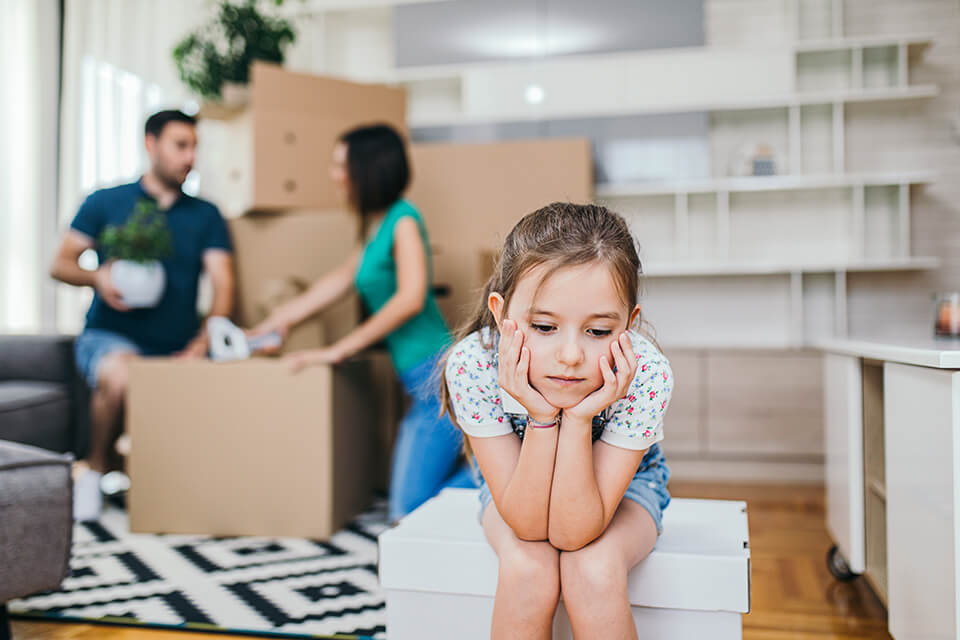What Are the Positive and Negative Psychological Effects of Moving Frequently
Are you curious about the psychological
effects of moving frequently or worried that relocations might affect your
or your children's mental health? This is a very complex topic, and the outcome
depends on many factors - one of the most important ones is your personality.
The way you see things, experience life challenges, and your core beliefs turn
you into a unique individual that might go through these phases like a victim
or a hero. The question is - which one will you become?

How Does Moving
a Lot Affect a Person?
Relocating frequently isn't completely natural, and it can definitely
have a certain effect on a person's mental health. Every time we move, we go
through certain relocation
stress. Stressing occasionally isn't
that dangerous as stressing over and over again and feeling certain relocation-related emotions that can shake
us to the core. Every person has a different capacity in dealing with
stressors, and that's known as the level of resilience. Someone can deal with
severe traumatic events and survive them unaffected, while mild stress can lead
to severe trauma for other people.
Is Moving Around Too Much Bad?
Relocation is known as one of the most traumatic events, so relocating
frequently is potentially dangerous. The negative effects depend on the type of
personality. If you're a person who's constantly
searching for something new or needs to change your environment in order to
feel happy and complete, relocating frequently doesn't have to be necessarily
bad for you. If, on the other hand, you deal with the smallest changes badly,
the emotional effects of moving frequently can be fatal for your mental
health.
Can Moving a Lot Cause Trauma?
Psychology shows that this isn't necessarily related to the number of
times you move. Sometimes, even the first big change you make in your life can
be experienced as a traumatic event. You need to learn how to adapt to many changes, and you don't
have any previous experience in this, so this will definitely be hard for you.
You might express anxiety about relocating, detachment issues, and
hopelessness. Negative emotions, cognitive dysfunctions, and even physical
symptoms might occur if you don't know how to deal with this process properly.
If you feel like these negative emotions overwhelm you, don't hesitate to look
for professional help.
In case you often move for work and love this at the beginning, it's
not excluded that one day you'll experience some negative emotions. Humans tend
to attach to other human beings and places. Once you start developing certain
feelings, making friends and start feeling accepted, there comes another
change, and you have to adapt to the new environment all over again. It is
likely that this might eventually lead
to burnout, so you always need to look for certain symptoms that will show
you if your mental health is in danger.

Why Is Moving
Good for Mental Health? You'll Meet New Friends and Have Amazing and Unique
Life Experiences
Apart from potential dangers, relocation can be a supreme chance for
mental growth and emotional development. One of the first major changes in
almost everyone's life is leaving their parents' home and starting life on
their own. Change in the environment has many positive effects on our
personality. We learn how to adapt to new conditions, how to overcome certain
situations on our own and how to handle various problems without anyone's help.
It is also likely that we'll stay open
for new experiences, and without that, we lose the opportunity for any
growth. Sure, the comfort zone is a comfortable place, but if you stay in it
for too long, you can experience the same negative emotions of hopelessness or
miss out on finding meaning and a purpose in life.
It Is Likely That You'll Get Better Life
Opportunities When You Move to a New Place
One of the biggest benefits
of relocating to a new place is that
this might bring you some amazing opportunities. For example, you could be moving in with your girlfriend
or boyfriend for the first time, which is a great chance for emotional growth.
You can also plan to move to another city
for a better job where you can succeed in your career. If you're relocating
with kids, they can get a chance for
better education. Relocations can also
be good for your physical health if you move somewhere where you can spend
more days in nature or simply lower the commute time, which will bring you
enough energy for other activities.
You Will Meet Many Interesting People
Psychology shows us that building deeper relationships with people is
good on many levels - it helps you feel understood and comfortable. One of the
things that relocations bring is an opportunity to make great friendships
and relations - from different cultures and with various experiences. Their
presence in your reality can sometimes have life-changing effects. You can
learn things that you never expected, you'll
learn how to communicate better and not waste time on insignificant
relations, and most importantly - you'll learn what you expect from others and
how you should treat them according to their actions towards you.
You'll Adapt to Changes and Challenges Quickly
and Efficiently
Another great benefit of relocating is that you'll learn how to deal
with numerous problems and situations because you'll find yourself in many of
them. If you live your whole lifetime in one place where everything is familiar
and things never change, you'll stay trapped in the same phase, and you'll
never learn how to overcome potential
obstacles that the future brings. Overcoming different issues on your own
will make you a stronger person, which will lead to a happier and healthier lifestyle.
You Won't Get Attached to Materialistic Things,
and You'll Value Experiences More
One of the biggest issues in modern lifestyle that psychology shows is that humans get
attached to materialistic things - one of the reasons they have anxiety
before relocating. We feel comfortable in our current surroundings because
we're used to it, and looking for a new apartment might seem like a nightmare.
How will you decide where to live,
how to organize your packing
for a move, and downsize it when
you want to keep everything? Someone who relocates often doesn't have a problem
getting rid of things
that they don't need, in fact, they stop getting attached to materialistic
things and become more open to different
experiences which they cherish and bring with them as memories. The more
often you move, the more you realize that relocating
furniture isn't the most important
thing, you'll organize your move better, learn how to avoid common relocation
mistakes and how to save money for important
investments.

What Are the
Negative Consequences and Psychological Effects of Moving Frequently
If you're moving out for the first time, you might be unaware of potential negative consequences
or even fail to recognize the clear symptoms of deranging mental health during and after this process. In order to
save yourself and stay protected from potential trauma, you need to be aware of
some negative things that might happen and the best ways to overcome them.
Sometimes You'll Feel Isolated and Lonely
One of the worst things that can happen is that you'll feel lonely and
isolated from some important life events of your friends and family, and this
is something you'll need to accept. It might be hard to miss your mother's
birthday or some other important occasion, but you can always find a way to show your appreciation by talking to your
family and friends frequently and sending them cards and gifts to show them
you care. They will be grateful for your attention, and you'll feel better and
closer to them even if you're far away from them.
You Can Experience Stress, Depression, and
Anxiety When Leaving Your Home
Stress is something that undeniably comes with relocation, so you'll
need to learn how to minimize it. Anxiety is also something that can occur
because it is known as a fear of the unknown, and that's closely related to starting a new chapter. Depression
might occur after the relocation process is over and you start experiencing
some negative emotions related to your move and change of environment. All of
these psychological side effects are closely connected, and you might
experience them occasionally, even without racial explanation. Mood swings are
understandable for someone who's going through big transitions, so you need to
give yourself enough time to deal with your condition.

You Need to pay
Extra Attention If You're Relocating With Kids
Last-minute moves are not healthy for children because they need more
time and capacity to adapt to changes, especially if they just adapted to the
previous place. Don't be harsh to them
and try to understand and respect their needs and aspirations as well. You're a
parent, so you should learn that sometimes you need to put your children's
well-being in front of your personal wishes. In order to have a healthy
childhood, you need to provide stability - that means a safe base where they
can always come back and a routine that will keep them focused on their
personal development instead of constantly spending their energy to adapt to
changes.

Best Tips For
Coping With Frequent Relocations
If you have to adapt to frequent
relocations because of your job
or any other reason, there are few coping tips that can help you deal with your
emotions:
● Stay physically active,
● Don't ignore your feeling and openly talk to
people,
● Express your emotions,
● Don't pressure yourself to achieve unrealistic
expectations,
● Find a hobby that it's not related to one place
or even better - the one that requires changing places,
● Reframe negative thoughts and always look for
positive aspects of a move.
● Don't cut off people from your past and stay in
touch with people you're close with, no matter the distance.

Hire Professional Movers For Assistance - This Will Help You Go Through Any Transition Easily
One of the things that you might find more than helpful during your
relocation process is hiring professionals. It will be much easier to move with
their assistance than going through everything on your own. Every relocation comes with different
challenges, and you can't be prepared for every situation and problem that
might occur, so having them by your side can sometimes feel life-saving. One of
the positive sides of relocating is that you can easily find convenient help by
using the Mod24 app to
compare moving companies.
Once you know where you are relocating and when all you need to do is
use this moving app to find available movers in your area. On this app for
moving, you can also find details such as potential pricing ratio and different
options. If you want to save money, you can always switch the date of your
move, or you can change the company.
The final price also depends on the services you choose, so sometimes
downsizing your move can be a convenient solution. If you're frequently
relocating, you probably don't bring many things with you for every move, so it
will be easier to find available and affordable help. Don't hesitate to reach
out to us if you have any questions - just contact our
customer service, and we'll try our best
to find you a suitable solution.

How to Declutter and Recycle for a Move
Moving soon? Simplify your life and reduce waste with these steps: Declutter: Sort belongings into...

How to File a Moving Insurance Claim
Filing a moving insurance claim can seem overwhelming, but it’s manageable if you follow the right ...

Checklist for Reducing Moving Anxiety
Moving can be overwhelming, but breaking the process into manageable steps can make it easier. Here...